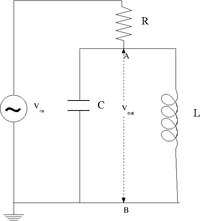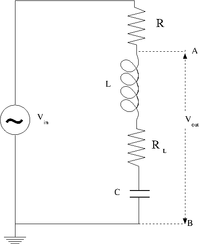Difference between revisions of "Lab 5 TF EIM"
Jump to navigation
Jump to search
| Line 6: | Line 6: | ||
#Measure the Gain <math>\equiv \frac{V_{out}}{V_{in}}</math> as a function of frequency. (20 pnts) | #Measure the Gain <math>\equiv \frac{V_{out}}{V_{in}}</math> as a function of frequency. (20 pnts) | ||
#Measure the Gain when an external resistance approximately equals to the inherent resistance of the rf choke <math>R_{L}</math>. (20 pnts) | #Measure the Gain when an external resistance approximately equals to the inherent resistance of the rf choke <math>R_{L}</math>. (20 pnts) | ||
| − | #Compare the measured and theoretical values | + | #Compare the measured and theoretical values of the resonance frequency (<math>\omega_{L}</math>) (10 pnts) |
==Questions== | ==Questions== | ||
Revision as of 04:28, 2 February 2011
LC Resonance circuits
The LC cicuit
- Design a parallel LC resonant circuit with a resonant frequency between 50-200 kHz. use = 10 - 100 .
- Construct the LC circuit using a non-polar capacitor
- Measure the Gain as a function of frequency. (20 pnts)
- Measure the Gain when an external resistance approximately equals to the inherent resistance of the rf choke . (20 pnts)
- Compare the measured and theoretical values of the resonance frequency () (10 pnts)
Questions
- If r=0, show that . (10 pnts)
- Show that at resonance. (10 pnts)
The RLC cicuit
- Design and construct a series LRC circuit.
- Measure and Graph the Gain as a function of the oscillating input voltage frequency. (20 pnts)
Questions
- What is the current at resonance? (5 pnts)
- What is the current as ? (5 pnts)

